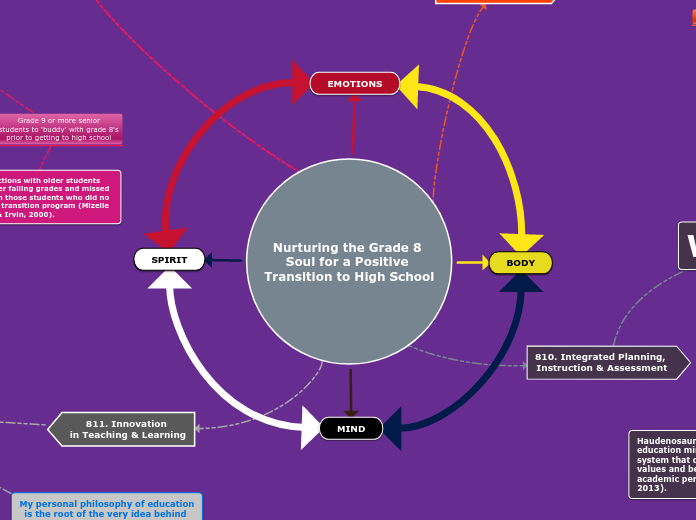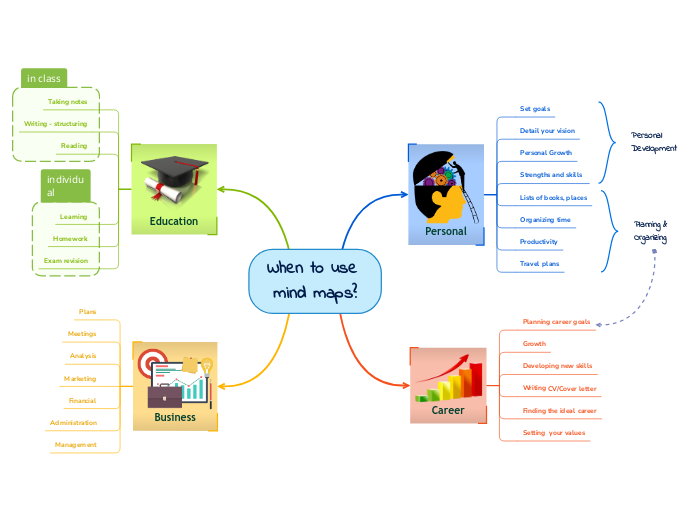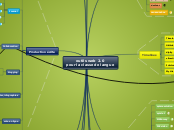Social interactions with older students resulted in fewer failing grades and missed fewer days than those students who did no participate in a transition program (Mizelle & Irvin, 2000).
Reference:
Mizelle, N. B., & Irvin, J. L. (2000). Transition from Middle School into High School. Middle School Journal, 31(5), 57-61. doi:10.1080/00940771.2000.11494654
My personal philosophy of education is the root of the very idea behind my capstone project; teaching the whole child in order for them to become successful in high school allowing them to become upstanding community members and proud members of the Haudenosaunee.
Haudenosaunee experiences in education mirror those of the Maori; a system that does not reflect cultural values and beliefs, resulting in poorer academic performance (Little, et al., 2013).
Reference:
Little, S. G., Akin-Little, A., & Johansen, A. (2013). Bi-cultural Aotearoa/New Zealand: Provision of psychological services to the Māori population of rural New Zealand: Combining best practice with cultural considerations. School Psychology International, 34(4), 428-438. doi:10.1177/0143034312446891
WHY?
7 Characteristics of Collaborative Inquiry
1. Relevant
2. Collaborative
3. Reflective
4. Iterative
5. Reasoned
6. Adaptive
7. Reciprocal
(Literacy & Numeracy Secretariat, 2014).
Reference:
Literacy & Numeracy Secretariat. (2014). Capacity building series: Collaborative inquiry in Ontario, What we have learned and where we are now (Rep. No. 39). Retrieved from http://www.edu.gov.on.ca/eng/literacynumeracy/inspire/research/CBS_CollaborativeInquiry.pdf
The Aotearoa/New Zealand Curriculum Framework (NZCF) was designed based on the needs and priorities of the Maori. It is meant to empower lifelong learning that is relevant to the wider world (Brown, 2006).
Reference:
Brown, G. T. (2006). Conceptions of curriculum: A framework for understanding New Zealand's curriculum framework and teachers' opinions. Curriculum Matters, 2, 164. Retrieved from http://go.galegroup.com/ps/i.do?p=AONE&u=queensulaw&id=GALE|A180748239&v=2.1&it=r&asid=54722ac5#
If students have a sense of identity and knowledge of themselves, they will be prepared HOLISTICALLY (which includes academically) for the challenges of high school.
Academically speaking
how do I prepare my students for high school classes?
Real professional learning can only happen through experience resulting in permanent change in knowledge or behaviour. Intentiional interruption of cogntive biases is necessary in order for this to happen (Katz & Dack, 2013).
Reference:
Katz, S., & Dack, L. A. (2014). Towards a culture of inquiry for data use in schools: Breaking down professional learning barriers through intentional interruption. Studies in Educational Evaluation, 42, 35-40. doi:10.1016/j.stueduc.2013.10.006
Activity Trap
Confirmation Bias
Self - reflection = BLOG post stating what I have learned throughout this process; questioning what went well, what could use improvement etc.
Reference:
Zimmerman, B. J. (2002). Becoming a Self-Regulated Learner: An Overview. Theory Into Practice, 41(2), 64-70. doi:10.1207/s15430421tip4102_2
Strategic Planning = focusing my project MIND MAP
Attention Focusing = creating a WEBSITE for teachers to view my transition plan for my 2019-2020 Grade 8 Graduates.
Also create a BLOG (as part of this website) where teachers will be able to collaborate/suggest ideas they have done in their classrooms for a smooth transition.
Using both proximal & distal goals I will set expectations for myself that I will obviously not be able to report on due the time contraints for this class, however, I will continue to work on this throughout my academic school year once it commences in September.
My distal goal will be to provide my students with the tools necessary to ensure a positive transition to highschool.
My proximal goals will run from month to month; that is to have an outside influence (Elder, agency, receiving high school's staff) work with my class focusing on one of the 4 parts of their holistic self ;mind, body, spirit, or emotion.
WHAT?
WHO?
HOW?
Use best practices and consult research
Engage in meangful dialogue with each other
Teachers must create learning opportunities that are authentic and meaningful for students for maximum retention and learning to occur (Brown, 2006).
Who can help make this transition positive for my students?
Former students/graduates
Knowledge Keepers
Chiefs, clanmothers, faith keepers from the longhouse
Inspirational
Speakers
Elders
Receiving highschools
Grade 9 or more senior
students to 'buddy' with grade 8's
prior to getting to high school
Guidance
Counsellors
Other experienced grade 8 teachers
Teachers from my reserve
Teachers from other reserves
Local organizations/agencies
Parks & Recreation
Indigenous Diabetes
Health Circle
New Directions Group
Child & Family Services
Health Services
Eduardo Briceño in his Tedxtalk reminds us about goal setting and the importance of making mistakes -
https://www.ted.com/talks/eduardo_briceno_how_to_get_better_at_the_things_you_care_about
Reference:
Briceño, E. (2016, November). How to get better at the things you care about. Retrieved from https://www.ted.com/talks/eduardo_briceno_how_to_get_better_at_the_things_you_care_about/footnotes
Nurturing the Grade 8
Soul for a Positive Transition to High School
810. Integrated Planning,
Instruction & Assessment
Conceptions of Curriculum
integrated
holistic
non-prescriptive
student centered
801. Collaborative
Inquiry
800. Self Regulated
Learning
SMART goals
Timely
Is this a good choice given the time of year?
Realistic
Is my project something I can accomplish given the time constraints?
Attainable
Are my timelines reasonable?
Measurable
Have included timelines for these goals?
Specific
Are my proximal and distal goals specific?
Student Self Regulation
This will be ongoing throughout the school year for projects throughout the year. Students will be introduced to the forethought, performance, and reflection stage.
811. Innovation
in Teaching & Learning
My philosophy of education is rooted in what I believe is the meaning of the Onén:ton Karihwatéhkwen whose literal translation is, what we say before we do anything important. It is commonly referred to by the Haudenosaunee people as the Thanksgiving. As human beings, before all else, we must be thankful for the day and all that it brings. I believe this is of the utmost importance to instil upon our future generations. Accepting each day with a good mind (Kanikonriio) allows students and teachers to show respect and fairness to all people. Kanikonriio permits individuals the space to provide and accept all teachings, traditional and new, through creative and innovative methods that meets the needs of all individuals.
I believe that while our language, tradition, and culture is old, it must evolve. As a teacher it is my job to model for my students, coworkers, and community that it is possible to evolve and conduct oneself with the Good Mind. It is my job to prepare my students to live in two-worlds; that is embracing their traditional culture while learning mainstream academics. I am committed to walking in two-worlds and will prepare by 1) dedicating myself to a lifelong journey of Kanien’kéha kateweiénhstha (learning Mohawk language); thus my culture to deepen my identity has a Haudenosaunee woman and 2) keeping my teaching methods current by attending professional development sessions to further my knowledge of innovations and creativity around teaching and learning.
Teaching the whole child (emotionally, mentally, physically, and spiritually) will allow me to develop relationships with my students that sees them understanding the very high standard I hold them to. Helping these students discover the individual gifts that each one possesses will allow them to not only live a healthy life, but also to become contributing members to our community.
EMOTIONS
MIND
BODY
SPIRIT









